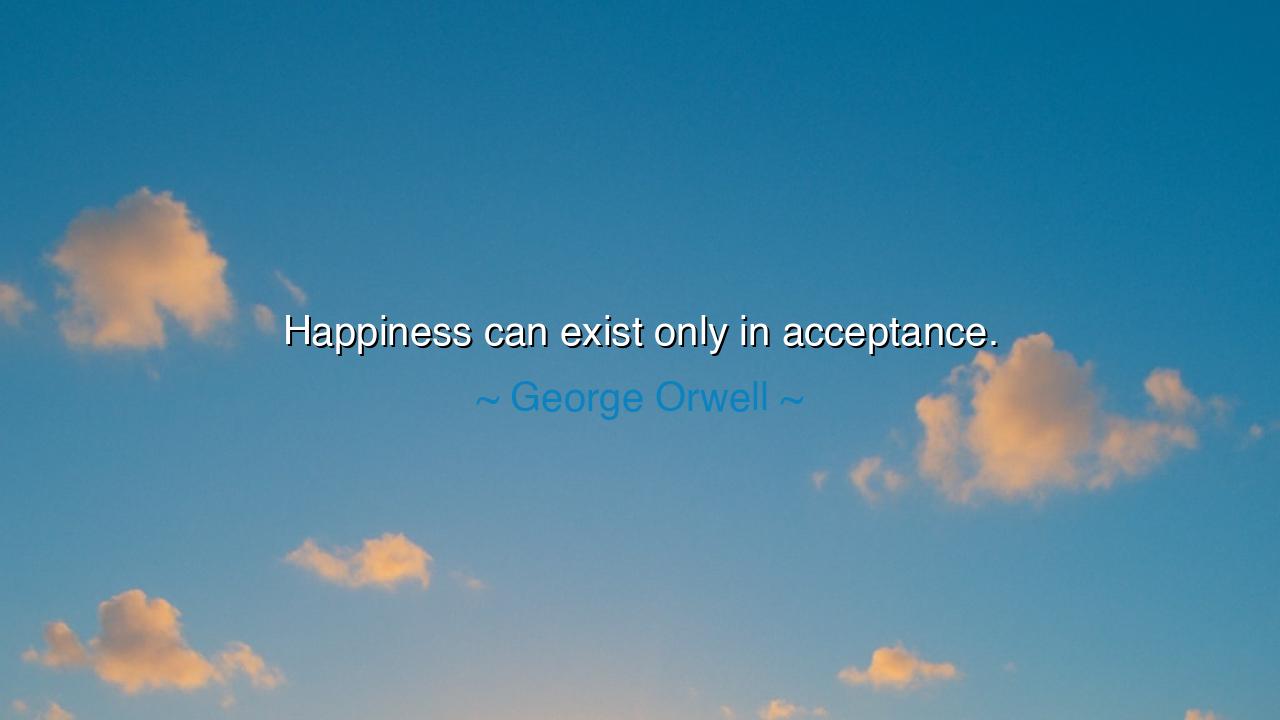
Happiness can exist only in acceptance.






“Happiness can exist only in acceptance.” So wrote George Orwell, a man who had walked through the smoke of war and the ruins of false ideals, who had seen both the heights of human courage and the depths of human cruelty. These words are not the idle musings of comfort, but the distilled truth of one who has faced disillusionment and emerged wiser. In them lies the wisdom of the ancients—that true peace of spirit does not spring from conquest or control, but from acceptance: the quiet bowing of the heart before what is, rather than endless struggle against what cannot be changed.
In this saying, Orwell speaks of a kind of freedom that cannot be granted by kings or governments. It is the freedom of the soul that arises when one ceases to fight against the nature of life itself. For the world is not made to bend to our desires. It moves according to its own law—the law of change, of loss, of imperfection. To resist this law is to live in sorrow, for no man can win a battle against the eternal tides. But when one learns to accept, to see beauty even in impermanence, and to find meaning even in suffering, then one tastes a deeper happiness than the world can offer.
In the East, the sages long ago taught the same truth. The Buddha, after years of searching through luxury and hardship, came to understand that all human pain arises from clinging—from the refusal to accept what is fleeting. When he let go, when he saw the world as it truly was—imperfect, transient, ever-changing—he found enlightenment, which is nothing other than perfect acceptance. Orwell’s words echo this same wisdom, spoken now not from a monastery, but from the battlefield of the modern world. For he saw that even amid political turmoil and the illusions of power, the soul that learns to accept reality as it is finds a peace no tyranny can take away.
Consider the life of Orwell himself, born Eric Arthur Blair, who fought against fascism, injustice, and deceit. He witnessed the corruption of ideals in Spain, the machinery of oppression in empires, and the deceit of propaganda in his own homeland. He endured illness, poverty, and betrayal. Yet even as the world burned around him, he found clarity—not in denial, but in acceptance of truth, however harsh it might be. His writings are filled with sorrow, yet beneath that sorrow is a strange serenity: the calm strength of one who no longer runs from reality. That is why his words endure—because they speak not to the dream of escape, but to the courage to see, to accept, and to continue living with dignity.
Acceptance does not mean surrender, nor does it mean the loss of will. It is not the weakness of resignation, but the wisdom of harmony. The river that accepts the shape of its banks does not cease to flow—it finds its way to the sea. So too must we flow through the contours of our fate, shaping our lives not by denial but by understanding. When grief comes, we accept it, and it softens into compassion. When joy departs, we accept it, and gratitude remains. This is the art of the peaceful heart, the balance between effort and surrender that makes happiness possible.
There was once a man named Viktor Frankl, a prisoner in the death camps of the Second World War. He was stripped of everything—family, freedom, dignity—yet he found within himself a strength that the guards could not break. He wrote later that “everything can be taken from a man but one thing: the last of human freedoms—to choose one’s attitude.” This was acceptance in its highest form: not approval of suffering, but the recognition of one’s power to meet reality with meaning. Even amid horror, he found a kind of happiness—not of the body, but of the spirit that refuses to be crushed.
And so, my children, let this be your lesson: acceptance is not the end of striving, but the beginning of peace. Do not fight the wind—learn to sail with it. Do not curse the darkness—learn to kindle your own small flame. When life wounds you, do not deny the pain, but hold it gently, knowing it too shall pass. To accept is to align oneself with truth, and from truth, all healing flows.
Therefore, practice daily the art of acceptance. Accept your past without regret, your present without bitterness, and your future without fear. In this way, you shall find a happiness that the world cannot promise, but that the soul can create—a happiness born not from possession, but from peace; not from victory, but from wisdom. For in the end, happiness can exist only in acceptance, and those who learn this truth walk quietly, yet unshakably, in the light.






AAdministratorAdministrator
Welcome, honored guests. Please leave a comment, we will respond soon